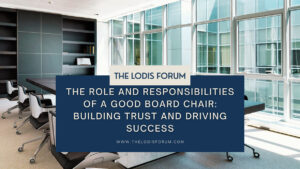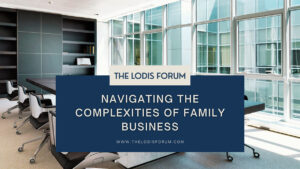Family business, a unique blend of personal and professional relationships, can thrive with the right strategies and family dynamics. The Lodis Forum recently had the privilege of speaking with Brad Fisher, Founding Partner of the Scalable Leadership Group and author of Family Business Abundance: How to Scale Your Company and Succeed Together Across Multiple Generations. His insights into unlocking the long-term potential of both business and family were not just profound, but also deeply transformative, inspiring a new way of thinking about family business.
Brad’s extensive entrepreneurial journey gave him a deep understanding of family businesses’ challenges and opportunities. His interest in family businesses is not just professional but deeply personal. Growing up in a family business, he witnessed its success and eventual tragic downfall due to poor family dynamics and a lack of clarity.
Brad built an extensive understanding of business when he started his entrepreneurial journey in 1983 with his first company. Over the next 20 years, he founded and sold multiple businesses, gaining extensive experience in the process. His intimate knowledge of family business and extensive business acumen make him a true thought leader who speaks from experience.
Brad emphasizes three key components for the success of family businesses: engagement, clarity, and scalability. These elements form the foundation of his framework for family business abundance.
“Engagement plus clarity plus scalability equals family business abundance,” Brad stated. “Understanding who your customers are, why they buy from you, and how your business model can be scaled effectively is essential.”
Engagement:
Engagement is not just a component but an essential element for the success of a family business. Family members are not just business participants but are integral to its success. Their active involvement and alignment with the business’s goals and values go beyond day-to-day operations, involving a deep commitment to the company’s long-term vision.
“Engagement is about bringing the family into the business early and helping them understand what it means to have a family business. They don’t have to have careers in the business, but they need to understand and be engaged,” Brad explained.
Creating an environment where family members feel connected to the business can increase loyalty, improve communication, and make a stronger sense of purpose. The best way to foster a culture of transparency and trust and strengthen the bond between family members and the business is to:
- Review transparent financial information and company performance
- Conduct regular family meetings to discuss business updates and future plans
- Inform the family about business decisions, even if they are controversial,
- Implement a fair and inclusive decision-making process where everyone’s opinion is heard and valued
- Bring the youngest generation into the family and business in an age-appropriate manner
- Address dysfunctional family dynamics proactively
Building strong family engagement is impossible without proactive communication and transparency with all family members. However, doing so can reap rewards for the family and accelerate the company’s growth.
Clarity:
Clarity involves more than just understanding roles, responsibilities, and the overall vision for the business. It’s about ensuring all family members feel secure and confident in their position and know their contribution is valued and understood. This clarity helps prevent conflicts and misunderstandings that can arise from ambiguous expectations.
“Clarity is critical. It’s about understanding who does what, why we’re here together, and what we stand for. You can get lost in the details and emotions without it,” Brad noted.
Family businesses should ensure that all members understand their specific roles and how they contribute to the company’s overall success. Clear documentation of the company’s mission, values, and long-term goals can provide a roadmap that everyone can follow.
Scalability:
Scalability is the ability to grow the business without overwhelming it. This involves having the right systems, processes, and infrastructure to support expansion.
“Scalability is about structuring the business to grow and thrive without as much pain. It’s about having the right tools, technology, and processes to support growth,” Brad emphasized.
Investing in technology, optimizing processes, and ensuring that the business model can handle increased demand are all part of achieving scalability. Regularly reviewing and updating these elements can help the business adapt to changing market conditions and opportunities.
The Role of Transformational Goals (T Goals):
A key component of Brad’s approach is setting transformational goals (T Goals). These annual priorities align with the company’s long-term vision and drive significant progress yearly.
“We set a clear 10-year business vision and then create T Goals to keep us on track. It’s like driving to Chicago from California; we know our destination and can adjust our course as needed,” Brad illustrated.
He emphasized the importance of having a clear destination: “Having a clear business vision for where you want to be in 10 years is crucial. It allows you to set transformative annual goals and keep you on track towards that vision.” It’s also imperative that the family understands the company’s 10-year vision and how it maps to the long-term vision, values, and long-term objectives the family has established. Without bringing the family along in the company’s 10-year vision, the business and the family can easily grow apart, resulting in the family not understanding or not being prepared to be stewards of the company as it evolves.
Unlocking the long-term potential of family businesses requires a strategic focus on engagement, clarity, and scalability. If they follow these principles, family businesses can ensure business success and harmony. “Family businesses have a secret weapon: trust and strong attachments. When structured properly, they can be incredibly powerful and effective,” Brad concluded.
Although the journey can be challenging, families willing to take these necessary steps ensure family businesses can overcome challenges, capitalize on their unique strengths, achieve lasting success, and finally, thrive.






